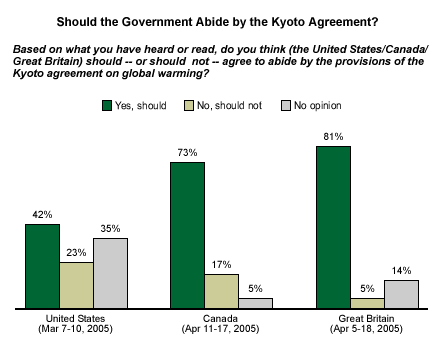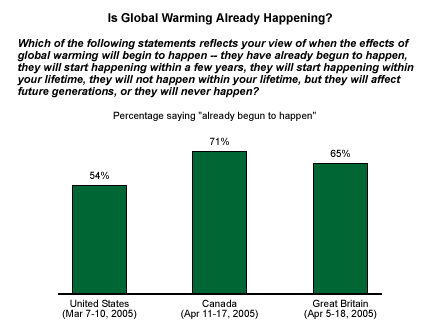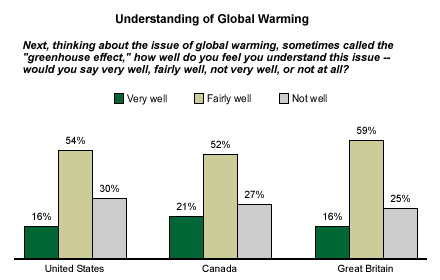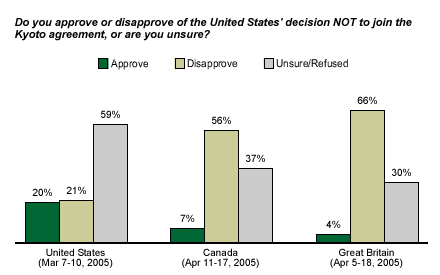When British Prime Minister Tony Blair hosts the G8 summit in two weeks, the topic of climate change will be on the agenda. Blair is a strong supporter of the Kyoto Protocol, which sets mandatory limits on participants' greenhouse gas-causing emissions, and he is anxious for the G8 to build on that foundation. Although President George W. Bush has adamantly opposed U.S. participation in Kyoto, he appears open to signing a G8-sponsored plan built around voluntary limits and market-led approaches.
The gulf between Bush and Blair over climate change policy is somewhat reflected in recent international ���۴�ýpolling*, according to which 81% of Britons and 73% of Canadians, but less than half of Americans (42%), say their own country should abide by the provisions of the Kyoto treaty. The U.S. support numbers are depressed by a substantial proportion of respondents (35%) without an opinion on the issue. However, the ratio of support to opposition among those with an opinion is still much lower in the United States than in Britain and Canada.

Americans are also less likely than those in Great Britain and Canada to believe the effects of global warming are already occurring. Fifty-four percent of Americans agree that "the effects of global warming … have already begun to happen," compared with 65% in Great Britain and 71% in Canada.

At the same time, residents of the three countries are similar in their assessments of how well they understand the global warming issue. Roughly 7 in 10 people in each country say they understand global warming either very well or fairly well. Sixteen percent of both Americans and Britons say they understand it very well, while Canadians are only slightly more likely (21%) to believe they are this well informed on the issue.
Only 25% to 30% of each nation's populace admits to not understanding the global warming issue.

Despite the similar levels of knowledge about global warming among Americans, Canadians, and Britons, Americans appear to be far less informed than those in Canada and Great Britain about the United States' position on the Kyoto agreement. When asked whether they approve or disapprove of the U.S. decision not to join Kyoto, the majority of Americans (59%) are unsure. In contrast, only 37% of Canadians and 30% of Britons are unsure about America's stance on the Kyoto agreement.
Among those who do take a stance, the balance of opinion is about equal in the United States, where 20% of adults approve of the U.S. decision not to join Kyoto and 21% disapprove of the U.S. decision. On the other hand, British and Canadian residents are highly critical of the U.S. stance on Kyoto -- 56% of Canadians and 66% of Britons disapprove of it.

Bottom Line
Since 2001, when Bush withdrew U.S. support for the Kyoto accords on global warming, he has been widely tagged as the world's environmental "bad guy." The executive director of Greenpeace recently described Bush's climate policy as "a menace to humanity."
���۴�ýdata suggest that this characterization may resonate with ordinary citizens in Canada and Great Britain, but perhaps not with Americans, who are relatively less certain about the threat posed by global warming. Americans are twice as likely to want the United States to support Kyoto as they are to want the United States to stay out of it (42% vs. 23%). But with a third (35%) uncertain on this question, that still leaves less than half the public taking a pro-Kyoto position.
*Results in the United States are based on telephone interviews with and 1,004 national adults, aged 18 and older, conducted March 7-10, 2005. For results based on the total sample of national adults, one can say with 95% confidence that the maximum margin of sampling error is ±3 percentage points. The survey was conducted by ���۴�ýUSA.
Results in Canada are based on telephone interviews with 1,006 national adults, aged 18 and older, conducted April 11-17, 2005. For results based on the total sample of national adults, one can say with 95% confidence that the maximum margin of sampling error is ±3 percentage points. The survey was conducted by ���۴�ýCanada.
Results in Great Britain are based on telephone interviews with 1,012 national adults, aged 18 and older, conducted April 5-18, 2005. For results based on the total sample of national adults, one can say with 95% confidence that the maximum margin of sampling error is ±3 percentage points. The survey was conducted by ���۴�ýUK.
